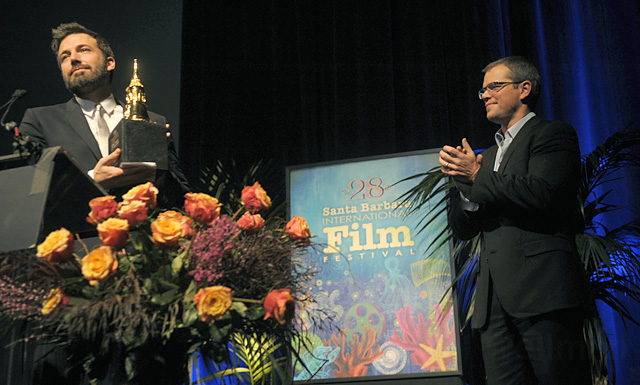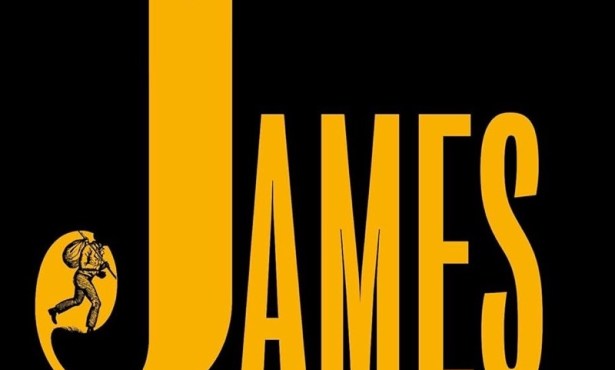Woodard’s SBIFF: Affleck and More
Sinking Into the SBIFFlow
Someday, somehow, somebody really should make a film about the miraculous rebirth — or self-awakening — of Ben Affleck, the once rightfully jeered-at actor in a series of turkeys, who found his true calling in director mode. Said movie about Affleck’s adventure might well include a scene from the SBIFF tribute on Saturday. His old pal Matt Damon showed up to offer a toast, and all was good.

Five years ago, it would have seemed absurd that Affleck’s name would grace the Arlington marquee alongside the phrase “Modern Master,” more absurd than the year Will Smith got his “Master” trophy. But that was before he pleasantly shocked us all with a bing-bada-boom series of films one better than the next: Gone, Baby, Gone, The Town, and the much-toutable Argo.
Onstage at the Arlington, in a genial exchange with veteran critic and prize interviewer/moderator Leonard Maltin, Affleck admitted about his tabloid sullied dog days, “I got overexposed and got sick of the paparazzi machine. I wanted out.” He had his route to salvation the form of an option on Gone, Baby Gone . “I started thinking of the movie.”
After conquering his terror of taking on the “monumentally complicated” task of directing, he obviously found his way, fulfilling what Damon later explained in his speech was an innate knack for knowing what makes a movie work, for “problem solving, a huge part of movie-making.” By way of dismissing Affleck’s early missteps on screen, Damon asserted that “in our business, the director is god, and like a good soldier, he did what he was told to do.”
Damon passed the hefty trophy to his Bostonian BFF at night’s end, after which his BFF started his acceptance speech by going on at length about Damon, before being chastised “you’re getting the award here,” Damon quipped. It was as if Affleck doesn’t quite believe the turnaround of affections and accolades pouring his way.
One actor very accustomed to the gush of attention for his talents, beginning around the beginning of his film career, is Daniel Day-Lewis, the tribute subject on tap tonight at the Arlington.
Meanwhile, in the “trenches” of the real meat of the festival, the screenings at the Metro homebase and elsewhere, things are looking healthy and strong, artistically. Even the weather is behaving, providing the sogginess suitable for heading indoors and indulging in a protracted and condense “trip to the movies.” More to the point, to sink into the schedule is to take a “trip to the world,” as the real prize of SBIFF is its function as a portal into the world — cinematically and existentially — into places in the world far beyond Hollywood.
Thankfully, the “I” part of the SBIFF acronym seems well-stocked this year, moreso than last year, when the programming was leaning into some different new avenues. Sometimes, accidental commonality of themes trickles through the films one sees in a given day or week, as happened on Friday with the Swiss Sister and the South Korean Pieta. The former is an alternately funny, pluckish, sad and renewing saga of down and out young man and his “sister,” in a funky town in the shadow of a swanky ski town in the Swiss Alps. The latter initially appears to fall into the ranks of graphic gothic Korean violence genre, but becomes evermore complex and moral as it goes. But in both films, the theme of twisted and unfolding family relations is at the core of their fabric, and their fascination.
From another end of the family story spectrum entirely, in director Kim Nguyen’s compelling War Witch, a rare and notably engaging saga of child soldiers in Africa, our kidnapped 12-year-old heroine is told by her captor that her gun is “your new mother and father.” A stylistically poetic film, it takes us on an almost subjective journey inside the life of a young girl, into the civil war-stricken chaos of her world, and an inner flame of hope contained in her narrative monologue to her unborn child.
Berlin Festival Silver Bear-winning director Christian Petzold’s Barbara is a powerful film, which takes its time and unfolds with a slow and quiet steadiness, and yet with subtle forces of tension beneath the calm surface at any given moment. That same dichotomy is what makes Nina Hoss’ cool, understated performance so masterful, and undoubtedly one of the great performances to be found at this fest. The subject is the lives of others, so to speak, in the repressive regime of East Germany before the wall’s fall, and doctors at a provincial hospital with secrets and passions kept carefully in check, while the scent of liberation lingers in the periphery.
Capturing such delicate balances of expression and unseen agendas is one of those special domains of the film medium, which keeps us coming back for more and more, which SBIFF handily supplies, for at least 10 days a year.



